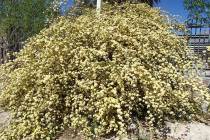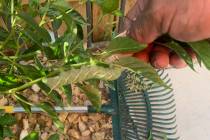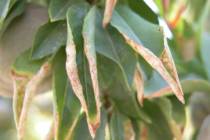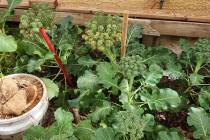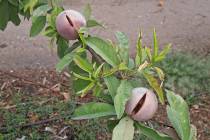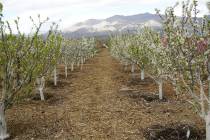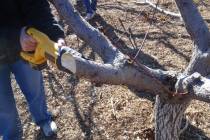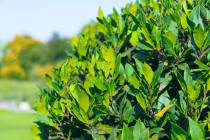Peaches, apricots available at orchard
Peaches and apricots are now available at the University of Nevada Cooperative Extension Master Gardener Orchard in North Las Vegas. Fruit being produced is for evaluation and research purposes. Donations for the fruit are used to support the growing activities of the orchard.
The UNCE orchard has mulch and compost available. The mulch is free of charge if you load it yourself. The compost is made on site and is available for a small donation.
We now have a phone number that you can use to call the university orchard directly. That number is 702-257-5532 and you can talk to an orchard volunteer Tuesdays, Thursdays and Saturdays from 8 a.m. until noon.
Q: I had an 8-by-1-foot garden box patch of asparagus that would have been in its third year of growth this year. Everything was fine the first two years but nothing grew this year. I pulled up several roots and noticed they are like a straw -- empty in the middle. I do not think I overwatered. The only thing I did different was I started emptying my daily coffee grinds in the garden patch. Do you have any idea what happened or was the cause?
A: The coffee grounds would not have made any great difference either way. Asparagus can be planted from crowns or seed. I have had great luck both ways and particularly like starting asparagus from seed.
We use an irrigation trencher and set it at its deepest setting, usually about 18 inches deep. We then backfill the trench about 8 to 10 inches with soil from the trench that has been heavily amended with compost made from animal manure, in our case horse manure, minus the large rocks.
This compost, a mixture of manure and plant waste, finishes in four to six months by being turned regularly and watered so that everything breaks down together. This finished or nearly finished compost is added to soil removed from the trench in a mixture of about three to one, compost to soil.
On top of the soil/compost layer we will spread a high-phosphorus fertilizer, such as triple super phosphate, to enhance root development. We will spread about one handful of this phosphorus fertilizer every 3 to 4 feet in the trench.
Asparagus crowns are then placed in the trench and covered with amended soil. This is usually about a 50/50 mixture of compost and soil minus large rocks. If you leave large rocks in the trench above the crown, it can cause crooked spears.
It is important to dig the trench or bed much deeper than the crowns or you will create a perched water table just above the unamended soil. This perched water table can drown the asparagus crowns and cause them to rot.
From your description that is what it sounds like. I would be careful planting asparagus in that same location. I would find a new spot and dig a trench or bed much deeper than you need to for drainage.
Q: I hear that there is a product called Zoom, which is organic chicken manure, at a local mass retailer. My daughter uses it and says she has had remarkable results. I wanted to know what you think about chicken manure. I also have a neighbor who raises chickens and probably has plenty of manure to go around. I need to know when is chicken manure not too hot to safely use or is that even a consideration?
A: Not all chicken manure is the same. If it has been composted, it is very safe to use . If it is just dried chicken manure without any composting, it can be quite hot and burn plants if you're not careful with it. This is because of the high salt content. Chicken manure releases its nitrogen the fastest among the different types of manures. This is another reason why it is considered so hot or easily burns plants.
I looked at the product page for Zoom and it is a composted chicken manure product so its burn potential should be quite low. We have used chicken manure that has been composted at the orchard and it is worked wonderfully as well.
You can break down raw chicken manure a little bit by composting it with some garden scraps, kitchen scraps, shredded newspaper and things like that for a month or two. Get it to rot so that it is all dark brown or black, then it won't be so hot.
Bob Morris is an associate professor with the University of Nevada Cooperative Extension. Direct gardening questions to the master gardener hot line at 257-5555 or contact Morris by email at morrisr@unce.unr.edu.










